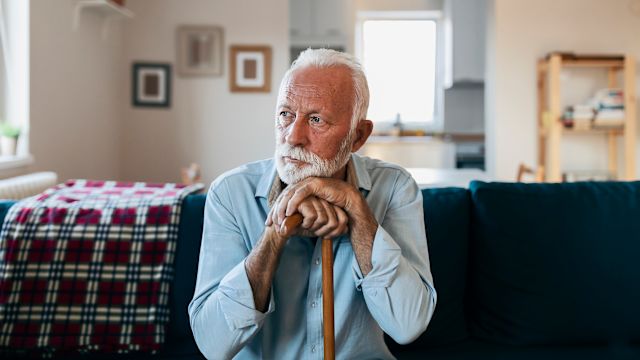Vision loss can make it harder—even impossible—to do certain activities you enjoy or to perform routine tasks, such as driving. Fears of falling or having to rely on others for help might prevent you from going places, socializing or being active. This unsettling lifestyle shift could help explain why vision loss may increase your risk for depression.
“It is difficult to live in a world where you’re not able to see,” says Yevgeniy Gelfand, MD, who specializes in psychiatry and internal medicine at Trident Medical Center in Charleston, South Carolina. “People who are visually impaired are more than twice as likely to develop depression than the general population.”
Vision loss can be isolating
Experiencing a deterioration in your eyesight—or a complete loss of vision—may be scary, and it could lead to concerns about losing your self-sufficiency or being unable to keep your job or care for your loved ones.
Being visually impaired also affects your ability to recognize familiar faces and maintain social connections, which can lead to isolation. Research shows that loneliness is associated with a higher risk for a variety of health issues, including mental decline, anxiety and depression. This is particularly true for people who are suddenly or unexpectedly isolated, including those who can no longer drive or lack transportation.
Older people are at higher risk
Vision loss—one of the top ten causes of disability in the United States—affects more than 12 million Americans ages 40 and older, according to the Centers for Disease Control and Prevention (CDC). Of these people, 4.2 million have a vision impairment that can’t be corrected. This number is expected to double over the next few decades as the population ages.
While loss of independence is not a normal part of aging, getting older does increase the risk for certain eye diseases that can lead to vision loss, such as cataracts, glaucoma and age-related macular degeneration (AMD).
In fact, AMD—a disease that destroys the part of the eye that is needed for clear, central vision—is one of the most common causes of vision loss. More than 14 percent of white Americans age 80 and older have AMD, according to the National Eye Institute. The agency estimates the number of people with the disease will double to 5.4 million by 2050.
Research also shows that about one-third of older adults with vision loss have symptoms of depression—twice the rate of depression among the general older population.
Be proactive about your vision
Some conditions that result in permanent vision loss, such as AMD, aren’t curable but there are treatments that can slow the progression of the disease. You can also take steps to prevent other causes of vision loss, such as diabetic retinopathy, a complication of diabetes that can lead to blindness.
“Taking good care of your overall health can help lower the chance of vision loss or the health conditions that can lead to it,” explains Dr. Gelfand.
Be sure to get routine eye exams. Some eye diseases do not trigger early warning signs. A comprehensive dilated eye exam is the best way to identify these conditions early on when they may be more effectively treated.
An estimated 61 million adults are at high risk for vision loss, yet only half of these people visited an eye doctor within the past year, according to the CDC. Those age 40 to 54 should undergo a comprehensive exam every 2 to 4 years, according to the American Academy of Ophthalmology. Adults age 55 to 64 should have repeat exams every 1 to 3 years, while those age 65 or older should have a comprehensive exam every 1 to 2 years. Anyone at higher risk for certain eye diseases, such as glaucoma, may need more frequent medical eye exams.
Talk to your healthcare provider (HCP) about what schedule is appropriate for you. Keep in mind, if you experience any changes in your vision or sustain any eye injuries, you should see your HCP right away.
Recognize symptoms of depression
If you or a loved one is already living with vision loss, it’s important to know the warning signs of depression. “It usually involves changes in behavior,” explains Gelfand, which can manifest in a variety of ways.
“Usually, people tend to withdraw and not be as social or as talkative,” he explains. “Even if they’re not that outgoing in the first place, they may stay more to themselves or not participate in their usual activities. There might be a change in how much they eat or how well they sleep. They might even be more irritable or not want to be approached.”
Someone with depression may also experience one or more of the following symptoms:
- Feeling sad, hopeless or “empty” for a prolonged period of time
- Feeling guilty, worthless or helpless
- Loss of energy or fatigue
- Moving less quickly or talking more slowly
- Memory problems
- Difficulty concentrating or making decisions
If you start to recognize any of these behaviors, it’s important to reach out for help. “If someone is visually impaired and they are showing signs that they may be having more anxiety and depression, take it seriously,” Gelfand advises.
Coping with vision loss
There are several steps you can take to help manage vision loss and depression.
Making some basic healthy lifestyle adjustments can help, Gelfand recommends. “Try following a good exercise and diet regimen, being social, and pursuing hobbies,” he says.
Vision-loss associated depression that’s fueled by a loss of independence may be eased by trying to become more self-sufficient. Steps to try:
- Find resources in your area. Many communities and some non-profit organizations offer transportation services, special accommodations or discounts for those who are visually impaired. The American Council of the Blind and the National Federation of the Blind may have more information on specific resources where you live.
- Sign up for vision rehabilitation. With some training or occupational therapy, many people with vision loss are still able to perform many routine daily tasks, such as paying their bills, preparing meals and choosing clothing. If you’ve been diagnosed with low vision, it can help to meet with a vision rehabilitation team who can help you learn how to maximize your remaining vision and teach you how to carry out daily tasks in new ways.
- Consider adopting a service dog. Specially trained guide dogs can help those with low vision or blindness improve their independence and mobility. These animals may also provide companionship.
- Use low vision devices. Employing a screen reader, hand-held magnifier or reading stand and supplemental lighting can help you see more clearly and participate in activities that you enjoy.
Socializing and seeking support can also help alleviate depression that’s tied to isolation and feelings of loss. Ways to stay connected to others:
- Be active on social media. Using a screen reader can help some people with low vision utilize social media platforms, such as Facebook and Instagram. Engaging with friends and family online could help you feel less isolated. You can even use social media to connect with and gain insight from others who are also living with vision loss.
- Lean on your loved ones. Don’t be afraid to ask for help. Whether your need a ride somewhere or help with your to-do list, chances are your loved ones will be more than happy to pitch in.
It may take time to adapt and grieve the loss of your vision, but don’t allow symptoms of depression to linger. If you need help managing depression, seek treatment from a healthcare professional who can help with talk therapy or even medication, adds Gelfand. “Reaching out for help is a sign of strength—not weakness,” he says.




